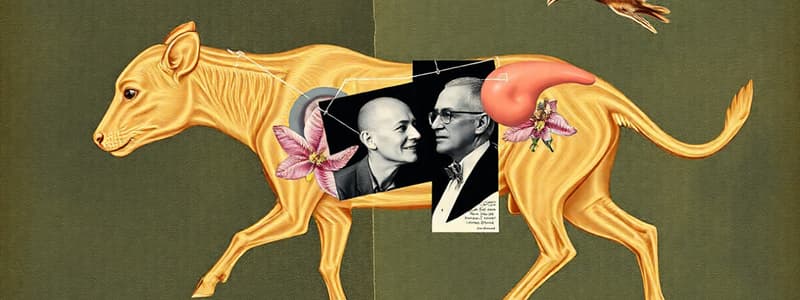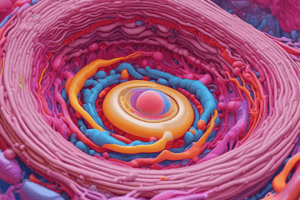Podcast
Questions and Answers
In mammalian development, which of the following is the correct chronological order of events?
In mammalian development, which of the following is the correct chronological order of events?
- zygote, four-cell, compacted morula, blastocyst (correct)
- compacted morula, blastocyst, zygote, four-cell
- four-cell, compacted morula, blastocyst, zygote
- blastocyst, zygote, four-cell, compacted morula
The first differentiation event following fertilization occurs when:
The first differentiation event following fertilization occurs when:
- the four-cell stage undergoes cleavage to generate the eight-cell stage.
- the trophoectoderm separates from the inner cell mass. (correct)
- the zygote divides to form two cells.
- the morula separates from the blastocyst.
In the mouse embryo, pluripotent stem cells are found in the:
In the mouse embryo, pluripotent stem cells are found in the:
- blastocoel
- zona pellucida
- inner cell mass (correct)
- trophectoderm
Daughter cells that form as a result of asymmetric cell division may differ in:
Daughter cells that form as a result of asymmetric cell division may differ in:
Which of the following genes are expressed exclusively in pluripotent embryonic stem cells?
Which of the following genes are expressed exclusively in pluripotent embryonic stem cells?
Fully differentiated mouse fibroblasts can be reprogrammed or induced to form pluripotent stem cells when transfected with retroviral vectors that express:
Fully differentiated mouse fibroblasts can be reprogrammed or induced to form pluripotent stem cells when transfected with retroviral vectors that express:
Dolly, the famous sheep, was cloned using:
Dolly, the famous sheep, was cloned using:
The use of cell-based models to understand or treat human disease processes is aided by stem cells in all the following ways, except:
The use of cell-based models to understand or treat human disease processes is aided by stem cells in all the following ways, except:
In the Drosophila ovary, which of the following proteins is secreted from the cap cell and is responsible for creating and maintaining the niche for germ-line stem cells?
In the Drosophila ovary, which of the following proteins is secreted from the cap cell and is responsible for creating and maintaining the niche for germ-line stem cells?
Which of the following is FALSE regarding the stem cells located in the epithelial lining of the small intestine?
Which of the following is FALSE regarding the stem cells located in the epithelial lining of the small intestine?
Which of the following is(are) in the cell lineage that gives rise to T cells?
Which of the following is(are) in the cell lineage that gives rise to T cells?
Floral meristems give rise to:
Floral meristems give rise to:
Define stem cells. Which of the following cells are stem cells: (a) fertilized egg, (b) intestinal crypt cell, (c) granulocyte-macrophage colony-forming cell (GM-CFC)?
Define stem cells. Which of the following cells are stem cells: (a) fertilized egg, (b) intestinal crypt cell, (c) granulocyte-macrophage colony-forming cell (GM-CFC)?
Which of the following provides evidence for the role of Paneth cells in supporting the intestinal stem cell niche?
Which of the following provides evidence for the role of Paneth cells in supporting the intestinal stem cell niche?
The mating projection or shmoo in budding yeast cells relies on having:
The mating projection or shmoo in budding yeast cells relies on having:
Even before the first cell division, the one-cell C. elegans zygote has an asymmetric distribution of:
Even before the first cell division, the one-cell C. elegans zygote has an asymmetric distribution of:
In C. elegans, which of the following is located in the lineage that gives rise to germ cells?
In C. elegans, which of the following is located in the lineage that gives rise to germ cells?
The apical-basolateral polarity of epithelial cells depends on which one of the following?
The apical-basolateral polarity of epithelial cells depends on which one of the following?
Which is the correct combination of proteins in polarized cells involved in planar-cell polarity?
Which is the correct combination of proteins in polarized cells involved in planar-cell polarity?
Epithelial cell tight junctions recruit:
Epithelial cell tight junctions recruit:
When a cell divides asymmetrically:
When a cell divides asymmetrically:
Which of the following is a feature that defines a cell dying in response to tissue damage (necrosis)?
Which of the following is a feature that defines a cell dying in response to tissue damage (necrosis)?
Which of the following genes encodes a caspase in C. elegans?
Which of the following genes encodes a caspase in C. elegans?
Which of the following apoptotic proteins is homologous to human Bcl-2?
Which of the following apoptotic proteins is homologous to human Bcl-2?
Which of the following forms a dimer that gets displaced from the surface of the mitochondria by EGL-1?
Which of the following forms a dimer that gets displaced from the surface of the mitochondria by EGL-1?
Which of the following triggers apoptosis?
Which of the following triggers apoptosis?
Apoptosis can be induced by a mitochondrial protein being released into the cytosol. This protein binds directly to what in the cytosol?
Apoptosis can be induced by a mitochondrial protein being released into the cytosol. This protein binds directly to what in the cytosol?
Mitochondrial permeabilization can be induced by compounds that poke small holes in the outer membrane. This would cause:
Mitochondrial permeabilization can be induced by compounds that poke small holes in the outer membrane. This would cause:
Examination of a cell's structure reveals condensed chromatin, a shrunken cytoplasm, but unfragmented DNA and a lack of blebbing. If this cell has been triggered to undergo apoptosis by an extrinsic factor, which of the following events has NOT likely happened yet?
Examination of a cell's structure reveals condensed chromatin, a shrunken cytoplasm, but unfragmented DNA and a lack of blebbing. If this cell has been triggered to undergo apoptosis by an extrinsic factor, which of the following events has NOT likely happened yet?
XIAP proteins:
XIAP proteins:
In cells that have been signaled to die via TNF-a receptor signaling but lack caspase-8 activity:
In cells that have been signaled to die via TNF-a receptor signaling but lack caspase-8 activity:
Flashcards
Mammalian fertilization chronological order
Mammalian fertilization chronological order
The correct sequence of events during mammalian fertilization is: zygote, four-cell stage, compacted morula, blastocyst.
Somatic cell nuclear transfer (mouse cloning)
Somatic cell nuclear transfer (mouse cloning)
Replacing the nucleus of an enucleated egg with a nucleus from a differentiated cell to create a clone.
First differentiation event (mammalian)
First differentiation event (mammalian)
Separation of trophoectoderm from inner cell mass.
Mouse pluripotent stem cells location
Mouse pluripotent stem cells location
Signup and view all the flashcards
Asymmetric cell division outcome
Asymmetric cell division outcome
Signup and view all the flashcards
Pluripotent embryonic stem cell genes
Pluripotent embryonic stem cell genes
Signup and view all the flashcards
Induced pluripotent stem cells (iPSC) creation
Induced pluripotent stem cells (iPSC) creation
Signup and view all the flashcards
Dolly the sheep cloning method
Dolly the sheep cloning method
Signup and view all the flashcards
Drosophila germline stem cell niche
Drosophila germline stem cell niche
Signup and view all the flashcards
Intestinal stem cell niche support
Intestinal stem cell niche support
Signup and view all the flashcards
C. elegans zygote asymmetry
C. elegans zygote asymmetry
Signup and view all the flashcards
Epithelial cell polarization
Epithelial cell polarization
Signup and view all the flashcards
Apoptotic proteins in C. elegans
Apoptotic proteins in C. elegans
Signup and view all the flashcards
Mitochondrial role in apoptosis
Mitochondrial role in apoptosis
Signup and view all the flashcards
Necrosis vs Apoptosis
Necrosis vs Apoptosis
Signup and view all the flashcards
Study Notes
Cell Birth, Lineage, and Death
- Mammalian Development: The correct chronological order of events is zygote, four-cell stage, compacted morula, blastocyst.
- Gamete Fusion (Fertilization): Sperm must penetrate cumulus cells and the zona pellucida (ZP) layer to reach the egg. Binding of sperm surface protein GaIT to ZP3 glycoprotein triggers the acrosomal reaction, releasing enzymes that degrade the ZP. This allows sperm-egg membrane interaction and triggers a calcium release within the egg that leads to cortical granule exocytosis. These enzymes alter the ZP to prevent polyspermy (multiple sperm fertilization).
- Somatic Cell Nuclear Transfer (Cloning): Transferring the nucleus of a differentiated cell into an enucleated egg can result in a clone. For example, a mouse's olfactory neuron nucleus can be transferred into an enucleated egg to produce a clone.
- First Differentiation Event (Fertilization): The first differentiation event after fertilization is the separation of the trophoectoderm from the inner cell mass.
- Pluripotent Stem Cells: These are located in the inner cell mass (ICM) of the mouse embryo.
- Asymmetric Cell Division: Daughter cells produced through asymmetric division may differ in size, shape, and protein composition.
- Pluripotent Embryonic Stem Cells: Genes like Nanog, Sox2, and Oct4 are exclusively expressed by pluripotent embryonic stem cells.
- Reprogrammed Pluripotent Stem Cells: Differentiated mouse fibroblasts can be reprogrammed to form pluripotent stem cells if transfected with retroviral vectors expressing KLF4, c-MYC, and SOX2.
- Stem Cell Niche (Drosophila): Germ-line stem cells in the fly ovary are maintained by the cap cells. They secrete TGF-β-like proteins (Dpp and Gbb) and Hh that bind to receptors, which signals (Mad, Med, and Schnurri) to repress the Bam gene. This repression maintains the stem cells, as continued Bam expression triggers differentiation to cystoblasts and eventually an oocyte.
- Lgr5+ Intestinal Stem Cells: Cre recombinase fused to the estrogen receptor (Cre recombinase-ER) is used in mice with the Lgr5 promoter to track these cells. When exposed to tamoxifen, it migrates into the nucleus and excises blocking DNA segments, allowing the -gal gene to be expressed, visible as blue staining.
- Stem Cell-Based Disease Models: Cell-based models enable drug screening and the creation of patient-specific cells that can replace those lost to disease.
- Apoptosis (Programmed Cell Death): Necrosis is defined by the lack of nucleus condensation and fragmentation, and the release and engulfment of membrane bodies. Apoptosis involves nucleus condensation, fragmentation, cell shrinkage, and preservation of membrane integrity.
- Mitochondrial Role in Apoptosis: Cytochrome c release from mitochondria triggers caspase activation in apoptosis.
- TNF-alpha Receptor Signaling: If caspase-8 is not present, cell death will proceed via a necroptosis pathway.
- XIAP Proteins: Inhibitor of apoptosis proteins. They inhibit initiator and effector caspases.
Studying That Suits You
Use AI to generate personalized quizzes and flashcards to suit your learning preferences.




